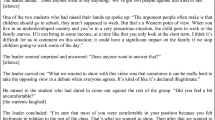Abstract
The integration of ethics into accounting curricula is a critical challenge facing accounting educators. The ethical subject matter to be covered and the role of the professor in ethical debates in the classroom are important unresolved issues. In this paper, we explore teaching basic values as an integral part of ethics education. Concern about indoctrination of students is addressed and the consistency of values education with the goals of ethics education is examined. A role for ethics researchers in identifying and clarifying the basic values that define our profession is recommended, and suggestions for implementing values education in accounting ethics are provided.
Similar content being viewed by others
References
American Accounting Association, Committee on the Future Structure, Content, and Scope of Accounting Education (The Bedford Committee): 1986, ‘Future Accounting Education: Preparing for the Expanding Profession’,Issues in Accounting Education 1, pp. 168–195.
American Institute of Certified Public Accountants: 1979, ‘Statements on Quality Control Standards’,AICPA Professional Standards 2, p. 17061.
Armstrong, M. B.: 1987, ‘Moral Development and Accounting Education’,Journal of Accounting Education 5, pp. 27–43.
Arthur Andersen & Co., Arthur Young, Coopers & Lybrand, Deloitte Haskins & Sells, Ernst & Whinney, Peat Marwick Main & Co., Price Waterhouse and Touche Ross: 1989,Perspectives on Education: Capabilities for Success in the Accounting Profession, pp. 1–15.
Atkinson, G., J. Buckeye and A. Trostel: 1987, ‘Incorporating Ethics into the Business Curriculum’,Teaching Philosophy 10, pp. 13–21.
Bok, D. C.: 1976, ‘Can Ethics Be Taught?’,Change, pp. 26–30.
Callahan, D.: 1980, ‘Goals in the Teaching of Ethics’, in D. Callahan and S. Bok (eds.),Ethics Teaching in Higher Education (Plenum Press, New York), pp. 61–80.
DeGeorge, R. T.: 1987, ‘The Status of Business Ethics: Past and Future’,Journal of Business Ethics 7, pp. 201–211.
Flew, A.: 1972, ‘Indoctrination and Doctrines’,Concepts of Indoctrination (Routledge & Kegan Paul, London), pp. 67–92.
Frankel, M. S.: 1989, ‘Professional Codes: Why, How and with What Impact?’,Journal of Business Ethics 8, pp. 109–115.
George, R. J.: 1988, ‘The Challenge of Preparing Ethically Responsible Managers: Closing the Rhetoric-Reality Gap’,Journal of Business Ethics 6, pp. 715–720.
Hitlebeitel, K. M. and S. K. Jones: 1991, ‘Initial Evidence on the Impact of Integrating Ethics into Accounting Education’,Issues in Accounting Education 6, pp. 262–275.
Ijiri, Y.: 1983, ‘On the Accountability-Based Conceptual Framework of Accounting’,Journal of Accounting and Public Policy 2, pp. 75–81.
Kohlberg, L.: 1981,The Philosophy of Moral Development, Moral Stages and the Elder of Justice (Harper & Row Publishers, Inc., San Francisco), pp. 17–19.
Langenderfer, H. Q. and J. W. Rockness: 1989, ‘Integrating Ethics into the Accounting Curriculum: Issues, Problems and Solutions’,Issues in Accounting Education 4, pp. 58–69.
Lev, B.: 1988, ‘Toward a Theory of Equitable and Efficient Accounting Policy’,The Accounting Review 63, pp. 1–22.
Loeb, S. E.: 1988, ‘Teaching Students Accounting Ethics: Some Crucial Issues’,Issues in Accounting Education 3, pp. 316–329.
Loeb, S. E.: 1990, ‘Whistleblowing and Accounting Education’,Issues in Accounting Education 5, pp. 281–294.
Loeb, S. E.: 1991, ‘The Evaluation of “Outcomes” of Accounting Ethics Education’,Journal of Business Ethics 10, pp. 77–84.
Macklin, R.: 1980, ‘Problems in Teaching of Ethics: Pluralism and Indoctrination’,Ethics of Higher Education (Plenum Press, New York), pp. 61–101.
Mappes, T. A.: 1988, ‘What is Personal Ethics and Should We be Teaching More of It?’,Teaching Philosophy 11, pp. 33–40.
Mayer-Sommer, A. P. and S. E. Loeb: 1981, ‘Fostering More Successful Professional Socialization Among Accounting Students’,The Accounting Review 56, pp. 125–136.
National Commission on Fraudulent Financial Reporting (Treadway Commission): 1987,Report of the National Commission on Fraudulent Financial Reporting.
Nazario, S. L.: 1990 (Apr. 6), ‘Schoolteachers Say It's Wrongheaded to Try to Teach Students What's Right’,The Wall Street Journal, pp. B1, B8.
Ponemon, L. and A. Glazer: 1990, ‘Accounting Education and Ethical Development: The Influence of Liberal Learning on Students and Alumni in Accounting Practice’,Issues in Accounting Education 5, pp. 195–208.
Powers, C. W. and D. Vogel: 1980,Ethics in the Education of Business Managers, The Teaching of Ethics V (Hastings-on-Hudson, New York: The Hastings Center, Institute of Society, Ethics and the Life Sciences).
Rest, J. R.: 1979,Development in Judging Moral Issues (University of Minnesota Press, Minneapolis), p. 247.
Rest, J. R.: 1986,Moral Development: Advances in Research and Theory (Praeger Publishers, New York).
Rosen, B. and A. L. Caplan: 1980,Ethics in the Undergraduate Curriculum, The Teaching of Ethics IX (Hastings-on-Hudson, New York: Institute of Society, Ethics, and the Life Sciences).
Shenkir, W. G.: 1990, ‘A Perspective from Education: Business Ethics’,Management Accounting 71, pp. 30–33.
Thurow, L. C.: 1975,Generating Inequality: Mechanisms of Distribution in the U.S. Economy (Basic Books, New York), p. 24.
Wilcox, R. T.: 1988, ‘Indoctrination is Not a Four-Letter Word’,The Clearing House 61, pp. 249–252.
Williams, P. F.: 1987, ‘The Legitimate Concern with Fairness’,Accounting, Organizations and Society 12, pp. 169–189.
Wilson, J.: 1986, ‘Relativism and Teaching’,Journal of Philosophy of Education 20, pp. 89–96.
Young, J. and O. Johnson: 1989, ‘On the Logical Foundation for Self-Regulation: Rules, Corporations, and Financial Reporting’,Research in Accounting Regulation (JAI Press, Inc., Greenwich, Connecticut), pp. 133–151.
Author information
Authors and Affiliations
Additional information
H. Fenwick Huss is Associate Professor of Accounting at Georgia State University. His recent research focuses on ethical and regulatory issues in financial reporting. He has presented papers and served as a panel member in sessions on ethics at regional American Accounting Association conferences.
Denise M. Patterson is a doctoral candidate at Georgia State University. Her research interests are in the areas of auditing and the impact of ethics on the role of the auditor. Denise has audit experience with an international accounting firm.
Rights and permissions
About this article
Cite this article
Huss, H.F., Patterson, D.M. Ethics in accounting: Values education without indoctrination. J Bus Ethics 12, 235–243 (1993). https://doi.org/10.1007/BF01686451
Issue Date:
DOI: https://doi.org/10.1007/BF01686451




